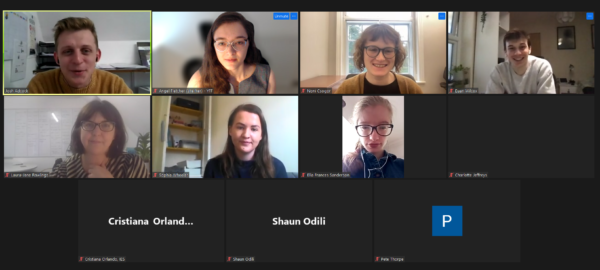Our November Youth Voice Forum focused on Vocational Education and looked at the proposed changes in vocational funding.
The session was chaired by Josh Adcock (Youth Employment UK) and aimed to feed into the current inquiry for the APPG for Youth Employment, whilst also teaching young people about the variety of pathways that exist and what the impact of the policy changes will be and have ample opportunity to share their experiences and opinions.
Laura Jane Rawlings (CEO of Youth Employment UK and co-chair of the YEG) introduced the session by giving an update on the work that the YEG are currently doing to advise the DWP and DfE on how to spend the money allocated in the Autumn Budget. She then provided an overview of the post-16 education options.
Guest speaker Noni Csogor (The Sixth Form Colleges Association) introduced the Protect Students Choice Campaign who are currently working to change the government’s mind about cutting a large number of BTEC’s, to be replaced by T Levels. T Levels are very specific and may alienate young people, who often want to keep their options open. She highlighted that this decision would not be felt equally and would affect young people from disadvantaged backgrounds more as they are most likely to be taking BTEC’s.
Then Youth Employment UK Youth Ambassador Euan Wilcox shared his experience doing a business management degree apprenticeship with IBM. He directly compared BTECs and A Levels as he had done both and felt that BTECs gave him a real world understanding of the topic that academic routes could not provide. He touched on the poor careers guidance he received at school whilst attempting to pursue an apprenticeship and described how he had been forced to submit a UCAS application despite this preference. Euan felt BTECs were superior to A Levels, in terms of their real life applications.
The Youth Discussion highlighted:
- Learning styles – pursuing vocational or academic routes should be to do with individual learning styles not academic performance. The move to T Levels can further disadvantage young people who do not perform well academically, because many come with requirements for English and Maths whereas BTECs have more flexibility.
- Teacher and School Influence – experiences of being pushed into certain paths by their schools creating a stigma around BTECs by pushing young people who don’t perform well academically towards vocational routes and only suggesting academic routes to those who are performing well.
- Careers Guidance – Some felt that careers advisers did not get to know them deeply enough to provide meaningful advice on what paths they should follow in the future, while others felt that guidance was so focused on university that they had to pursue alternative routes with very little support. The result of this being that young people had to make key decisions on their own and with minimal guidance, which made the process much harder for them.
- The Employer – Careers Fairs were cited as a positive example of careers education, not just in helping young people to think about the future, but also in developing brand recognition amongst young people. On the other hand, there were accessibility problems in job descriptions, applications, and interviews that particularly affect young people from disadvantaged backgrounds.
Suggestions moving forward:
- Learning styles – Increased focus on learning styles in schools as well as communications on different paths that suit these different learning styles. BTEC’s should be kept and student’s choice protected.
- Teacher and School Influence – Training for teachers around vocational education and schools to share a broader range of post-16 options to young people, with training for staff so that they can support young people with non-university routes.
- Careers Guidance – Improved training for careers advisers and accountability measures for providers of careers guidance to ensure that young people are receiving high quality support
- The Employer – Are encouraged to make their application processes “youth friendly” and accessible, to ensure they are reaching the most diverse pool of applicants. Resources and advice to be provided to employers on how to benefit from various government schemes that support vocational routes for young people.
More about the Youth Voice Forum
The purpose of the YVF is to create a safe space for young people to come together and discuss the views, experiences & challenges that they face as a direct result of Covid-19. Here they also support the work that the YEG do and have an active voice in influencing policy. The YVF ensures policy responses genuinely reflect young people’s needs and perspectives by providing young people with opportunities to identify what changes need to be made and discuss solutions to the problems they themselves have identified.
If you want to find out more about joining the Youth Employment Group you can find out more and sign up here.












